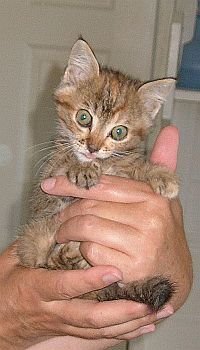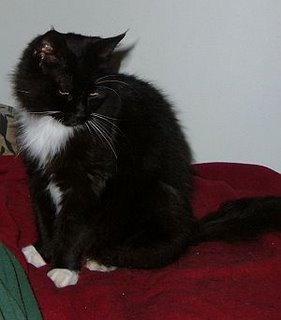 People often assume that cats as a species are not able to be trained and that they can only be relied on to do what comes instinctively. I've always been attracted to felines because they seemed to have independent minds, much as people do. I've found that if you think of training to be a medium of non-verbal communication by a series of ritualized actions, cats are imminently trainable companions.
People often assume that cats as a species are not able to be trained and that they can only be relied on to do what comes instinctively. I've always been attracted to felines because they seemed to have independent minds, much as people do. I've found that if you think of training to be a medium of non-verbal communication by a series of ritualized actions, cats are imminently trainable companions. The problem is that a person will have little success using certain training techniques with a cat that they are able to use with a dog, such as punishment or lecturing. Some people specialize in being able to use only certain techniques. If these do not work, the solution is to apply them longer, faster or more violently. If a certain strategy does not work, a more exaggerated version of it is likely to have a worse effect. But many people don't seem to understand this observation. Thus, they believe that training a cat is impossible. To be able to train a cat and not the other way 'round, you need to be more intelligent than the cat is!
Cats respond really well to what is known as "behavior trains." This means that if the cat is sitting somewhere and you pet it, it will be likely to associate these two experiences with each other. Soon you'll be finding the cat sitting in that certain spot to tempt you so you may come up and pet it.
A behavior train goes something like this; you see the cat on the end of the couch by the door and you pet it, it purrs. When it purrs, you give it a treat that you have hidden in your pocket; then you open the door and the cat gets to go outside. Pretty soon, you'll have a cat who wants to go outside or wants a treat, sitting on the couch purring and looking at you expectantly and sometimes meowing when you open to door to communicate that it's the treat she wants, and not going outside.
This is why cats can get obnoxious when you take out the can opener and open any can. They learn to associate the sound of the can opener with the arrival of the food in the dish for them. I've had a cat who was very intelligent and learned quickly that her rather loud meow was very effective at getting a reaction out of me. I quickly learned that if I only fed her at dinnertime, then I was less likely to ever be woke up out of a dead sleep at 4am by a cat who was impatient for me to get it together to hand out breakfast.
 At one time in the past this same smart cat, (pictured here,) learned a very long train of unkitty-like behaviors. I had moved into an RV that was parked across and down the street from where she spent the daytime with her kitty family. At the end of the day, I would come and fetch her from the yard of that house and carry her into my RV where she ate and slept for the night with me. By putting her down further and further away from the RV, she learned to scoot behind two houses; to wait at the end of the drive for me to indicate it was OK to cross the busy street; and to run quickly across the street; waiting at the door of the RV for me to key it open so she could slip inside. I guess it added to the challenge that there were possible canines in the area who could interfere with her that I was sure to protect her from.
At one time in the past this same smart cat, (pictured here,) learned a very long train of unkitty-like behaviors. I had moved into an RV that was parked across and down the street from where she spent the daytime with her kitty family. At the end of the day, I would come and fetch her from the yard of that house and carry her into my RV where she ate and slept for the night with me. By putting her down further and further away from the RV, she learned to scoot behind two houses; to wait at the end of the drive for me to indicate it was OK to cross the busy street; and to run quickly across the street; waiting at the door of the RV for me to key it open so she could slip inside. I guess it added to the challenge that there were possible canines in the area who could interfere with her that I was sure to protect her from.Also in the past I had a wonderful ragdoll Himalayan who loved to be spun on a barstool so fast that you had to put your foot on it to keep it from falling over. She purred the whole time, and got off of the stool like a drunk. I should have put her on Letterman or something then.
Any kitty stories that you have?
Give me a break. Cats will only do things that benefit
ReplyDeletethemselves. Cats do things because they want to. I wish I could
do the same. But I do things because I have to. Cats have it
made. My cat sleeps 18 hrs a day gets up only to eat, shit, or
play, or if he wants me to scratch his ass or kiss it.
Luv yah,The gumba
I know a few people who I have observed exercise the same priorities as your cat... Max and 99 are obviously lucky to claim you as their human. Hey, at least you know exactly who you're workin' for...
ReplyDelete;o)